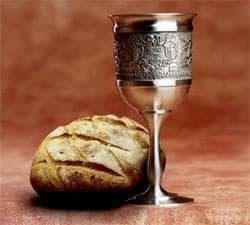One of our great privileges in this congregation is the privilege of coming to the Lord’s Table weekly. When we come to the Lord’s Table, we are coming to the Lord Himself, and why wouldn’t we? We are evangelicals; we believe in coming to Jesus.
In the midst of the great Reformation, the great John Calvin wanted to institute monthly communion (moving from quarterly), but was prevented by political forces. He had to settle for writing down in their public acts that their “custom was defective,” and that the Supper should be “in as frequent use as practicable in His Church, according to His own institution, and as it was observed in the Ancient Church.” Sadly, the resistance that Calvin met with remained the norm. About the only one of Calvin’s heirs who was able to successfully move to weekly communion was the great Baptist preacher, Charles Spurgeon. As one historian notes, “he was a vigorous promoter of celebrating Holy Communion each Lord’s Day.”
To be invited to share table fellowship with the Lord Jesus is to be invited to be His friend (John 15:15). Why wouldn’t we come, as often as we worship Him? This coming is not merely intellectual. We sit, we sing, we eat, we drink. We are members of the same household as Jesus Christ is. He calls us friends.
This is why we call it communion. We are sharing together. We are partaking together. We come because we have communion with God, and because we have communion with God we have communion with one another. We love God, and so it is that we love our neighbor as well.
This is great privilege indeed, especially when we are mindful of our own infirmities. Like that poor woman with the long hemorrhage in the gospels, you come here in order to touch Jesus Christ. You have come, trembling in your infirmity, and are released from here as His friend, trembling for joy.
So come, and welcome, to Jesus Christ.



Why the resistance to weekly communion in the early Reformed era? — felt too Romanish?
Actually at the time of the Reformation, most Catholics had communion very infrequently. Even some orders of monks and nuns had communion only 3 or 4 times a year. I’m not sure why the idea that weekly communion is a “Romanish” thing is so prevalent, because those arguing in the time of the Reformation for weekly communion were definitely going against the grain of the current Roman church.
I think weekly is right. Mass daily seems a little enthusiastic and while I wouldn’t prevent it, it is unnecessary.
But Baptists are monthly, I believe Adventists are quarterly. What are useful ways of addressing this and getting Protestants as a whole to move toward weekly communion?
He didn’t say, “this is my body…….do this in remembrance of me, just once in a while”. So why not take Him at His word? It was repeated enough times to convey its importance.
And let not what the Romans do, be a factor in deciding when.